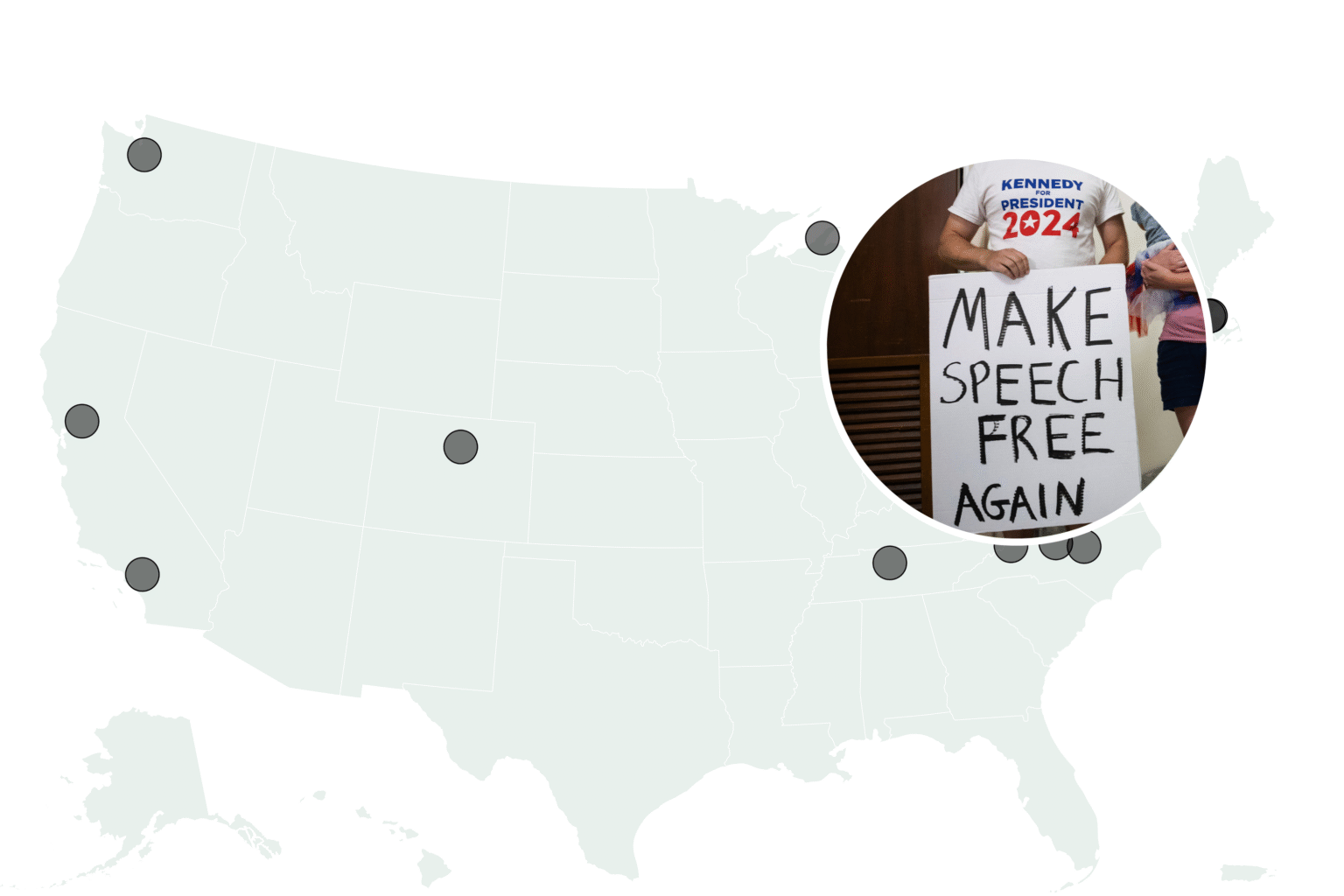The Foundation for Individual Rights and Expression (FIRE) released the sixth annual College Free Speech Rankings this week. The survey ranked 257 schools based on the responses of more than 60,000 responses to a multitude of free speech related questions.
Newsweek has compiled the top and bottom 20 colleges into a map.
The Context
FIRE’s report was released on September 9, before the fatal shooting of conservative activist Charlie Kirk.
Kirk, 31, founded the right-leaning youth organization, Turning Point USA, in 2012 and was a longtime ally of President Donald Trump.
He was delivering a speech under a campus tent in Orem, Utah, when he was struck in the neck by a single gunshot. Kirk collapsed, was rushed to a hospital, and was later pronounced dead. Kirk’s killing has drawn widespread condemnation from all corners of the political spectrum and illuminated fears about the country’s escalating climate of political violence.
The shooting comes amid a broader climate of political violence across the United States. In June, Minnesota Democratic state Representative Melissa Hortman and her husband were shot and killed in a targeted political act.
What To Know
Free speech on college campuses has long been a source of scrutiny in America, whether there are concerns over press freedom, outcries in response to and cancellations of certain speakers, or student protests being quashed.
The FIRE report found that only 36 percent of students said that it was either “very” or “extremely” clear that free speech is protected on college campuses.
Of the 257 schools surveyed, 166 received an F for their speech climate, and only 11 institutions were given a grade of C or higher.
FIRE Chief Research Advisor Sean Stevens, who authored the report told Newsweek via email: “For decades, the research literature on censorship has found that most people say they love free speech in the abstract and would not want to see anyone’s speech limited in some way, but that this changes very quickly when they are given an example of something the person has previously said or is likely to say. Most people have a line somewhere, and when it’s crossed, they support censorship. Undergraduate students are no different. But the more recent declines evident in our survey data over the last few years are concerning.”
Stevens added that “Policy-wise, most schools aren’t even meeting the bare minimum—’green light’ speech policies, a neutral institutional stance during political controversies, and a full-throated endorsement of the value of free expression and academic freedom. If more of them simply did that, the average would be considerably higher, likely in the C range—as one would expect in a college course.”
Pointing to the schools which had the better free speech ranking, Stevens said the common thread at these schools is “Strong leadership and a commitment to upholding freedom of expression.
The best colleges for free speech
- Claremont McKenna College
- Purdue University
- University of Chicago
- Michigan Technological University
- University of Colorado, Boulder
- University of North Carolina, Greensboro
- Vanderbilt University
- Appalachian State University
- Eastern Kentucky University
- North Carolina State University
The worst colleges for free speech
- Loyola University, Chicago
- Middlebury College
- New York University
- Boston College
- University of California, Davis
- Northeastern University
- University of Washington
- Indiana University
- Columbia University
- Barnard College
What People Are Saying
FIRE Chief Research Advisor Sean Stevens, who authored the report, told Newsweek via email: “While identifying any causal factors driving this increase goes beyond the scope of our data, we can speculate. Intolerance can rise with increases in political polarization, something that has been happening among the general public for a while. I do think the features offered by social media, the ability to curate a feed with things one likes while filtering out things they don’t like or want to see, play into the rise in intolerance among today’s undergraduates.
As social life, and just life, increasingly occurs online and in social media spaces one can easily become accustomed to the curated environment that you’ve created. College takes a lot of the filtering tools away. Students are exposed to ideas they may consider offensive and even abhorrent. This can happen at orientation, in the classroom, or pretty much anywhere on campus and in almost any setting. Administrators though, can rectify this. So, students file complaints or create petitions demanding a speaking event be canceled or a professor be fired. When these kinds of things happen, and they inevitably will, schools need to protect free expression and academic freedom because when they don’t, it sends a message to students and faculty about what kinds of expression are acceptable on campus and what kinds are not.”
What’s Next
Flags have been ordered to fly at half-staff to honor Kirk until 6 p.m. Sunday, by President Donald Trump.
The fatal attack has raised concerns about campus public-safety protocols, political violence, gun control, and free speech.
Read the full article here

